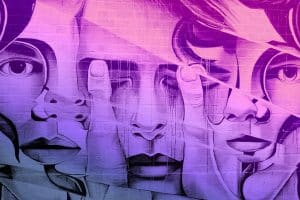It would be inaccurate to call Roger Steffens simply a photographer. Though he picked up photography during his service in the Vietnam War, it wasn’t until the native Brooklynite returned stateside, settling in the Bay Area and then Los Angeles, that he began to capture quintessential California. Through his lens, we witness the birth of modern psychedelic culture, as Steffens captures the magic of the zeitgeist, from the late Sixties through the early Nineties. He chronicles friends and family, and a cast of characters—from Bob Marley to Timothy Leary—who defined the counterculture. For decades these photographs went unseen—and today, they’re widely known through “The Family Acid” Instagram account.
Multidimensional in every definition of the word, Steffens also worked as an actor, author, editor, DJ, reggae archivist, lecturer, and radio producer with LA’s NPR affiliate, KCRW, where in 1986—shortly after news of the Iran-Contra scandal broke—he interviewed Leary. (At the time, Steffens recalls, “Tim was stoked, thought Reagan was going to jail.”) In this previously unpublished radio chat shared with DoubleBlind, Steffens and Leary purvey the spirit of the times, exploring politics and punk, literature and LSD, psychedelic frenzy and the future of it all.

DoubleBlind is a trusted resource for news, evidence-based education, and reporting on psychedelics. We work with leading medical professionals, scientific researchers, journalists, mycologists, indigenous stewards, and cultural pioneers. Read about our editorial policy and fact-checking process here.

DoubleBlind Magazine does not encourage or condone any illegal activities, including but not limited to the use of illegal substances. We do not provide mental health, clinical, or medical services. We are not a substitute for medical, psychological, or psychiatric diagnosis, treatment, or advice. If you are in a crisis or if you or any other person may be in danger or experiencing a mental health emergency, immediately call 911 or your local emergency resources. If you are considering suicide, please call 988 to connect with the National Suicide Prevention Lifeline.


